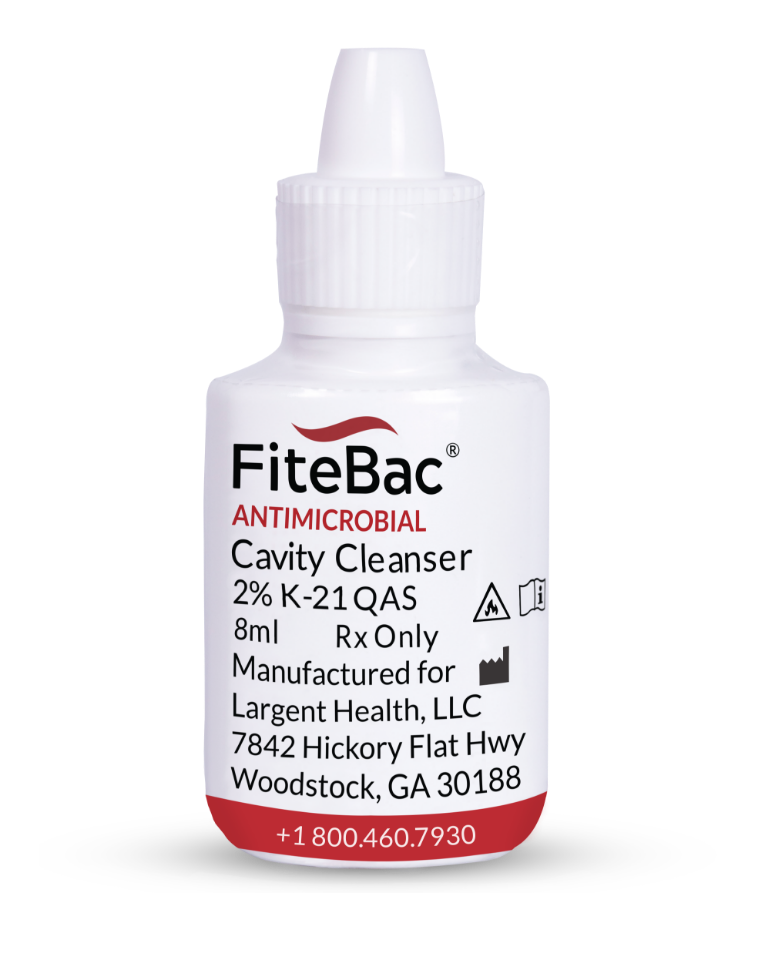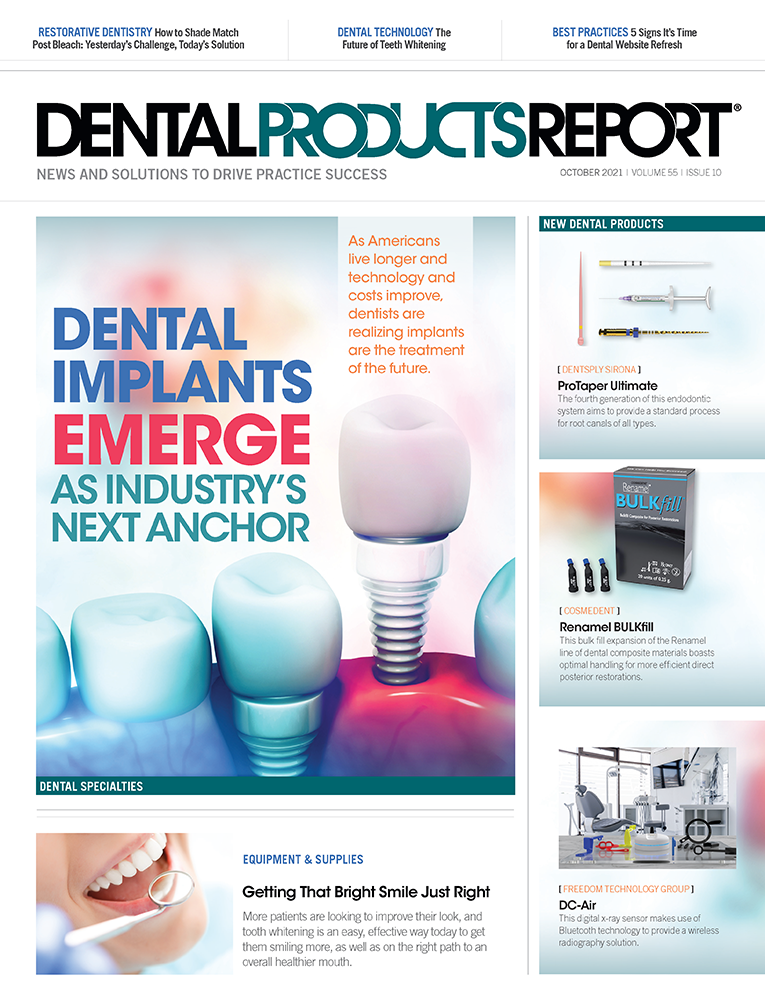They say practice makes perfect. But what makes a perfect practice? I would argue the most important factors are prioritizing patient welfare and creating a trusting doctor-patient relationship by communicating clearly and getting things done right the first time.
By the end of this month’s Deep Dive, we hope to have shared the excitement I have about antimicrobial dentistry and the exciting potential it represents for dentists and patients. Change is here for the world of dentistry. Virtually all restorative materials and dental devices/products can now be antimicrobial or biofilm-resistant to provide a new standard of care.
The International Organization for Standardization (ISO) is addressing standards for the evaluation of antibacterial activity of dental restorative materials, because of recent technological advances. From the food we eat to the vehicles we drive to the performance of adhesive to tooth structure, ISO establishes standards for almost everything. These important metrics are set and enforced for the benefit, safety, and health of consumers all over the world. If new technology arrives, it needs to be studied, proved, and codified so that industries and consumers can react appropriately. This is happening right now in dentistry.
In 2020, FiteBac became the first company to release an FDA-cleared antimicrobial cavity cleanser. Research shows that FiteBac Antimicrobial Cavity Cleanser not only helps remove debris in carious lesion preparations but also helps reduce microbial contamination. FiteBac Dental is leading a transformational shift to antimicrobial dentistry with patented antimicrobial chemistry, powered by their lead molecules K18 and K21, present in multiple FDA-cleared devices. To develop this novel chemistry and its applications in dentistry, FiteBac founder Kirk Kimmerling, DDS, found the ideal partners at the Dental College of Georgia at Augusta University: Franklin Tay, PhD; David Pashley, DMD, PhD; Fred Rueggeberg, DDS, MS; and Babak Baban, PhD, MPH, MBA, MS.
FiteBac Cavity Cleanser
Created to provide antimicrobial properties at the site of a dental restoration, FiteBac® Cavity Cleanser is a 2% K21 QAS aqueous ethanolic solution for use on cavity prep sites. The solution can remove debris in carious lesion preps as well as penetrate exposed dentin tubules, found to increase bond strengths to dentin while also helping to manage residual contamination of the restoration site. The material can help eliminate and prevent recurrent decay beneath the restoration or at margins, extending the life of the prosthetic solution.
FiteBac Dental
424-FITEBAC
fitebacdental.com
Dr Tay, recognized as a prolific researcher, orchestrated dozens of dental researchers and scientists throughout the world to study the technology. He and his team have published numerous papers on FiteBac chemistry and the performance of FiteBac antimicrobial additives in many dental materials.
FiteBac technology has been explored around the world and investigated at over 20 universities, strengthened by international perspectives and expertise. One defining characteristic of FiteBac technology continues to surface in application and efficacy testing: its ability to bond with materials and provide durable antimicrobial effect and protection. The lead molecules, K18 and K21, can be incorporated into existing products and provide antimicrobial effect without negatively impacting the strength, flexibility, or durability of the existing product. Studies have also shown that the addition of a FiteBac molecule to a resin product provides antimicrobial properties and allows for even more flexural strength compared to the original formulation.
FiteBac Dental has entered the market with built-in authority and proven technology from published, peer-reviewed academic research, international patents, and FDA recognition. What’s next? FiteBac has recently scaled chemical manufacturing of antimicrobial additives for use in dental composites, dentures, crowns, bonding agents/adhesives, sealants, cements, endodontic sealers, resin systems, 3D-printed materials, implants, flexible silicone mouth guards, night guards, retainers, mouthwash, and periodontal disease treatments.
In late September, FiteBac Dental was a new featured presenter at the world’s largest dental conference, International Dental Show (IDS) 2021, in Cologne, Germany. Global dental manufacturers met with the FiteBac team to license the technology as antimicrobial additives, which are already present in multiple FDA-cleared dental devices, to change their legacy products into new, superior, antimicrobial ones. The company wants everyone to benefit from what they’re offering and embrace the motto found on their website: Better products mean better patient outcomes.
Manufacturers that currently make restorative materials wereable to see firsthand, what FiteBac has to offer at IDS. Adhesives, bonding agents, glass ionomers, sealers— whatever a company makes—can take FiteBac-powered ingredients and make their existing products antimicrobial. The potential doesn’t end there. Their additives can make existing products such as dentures, sutures, night guards, 3D-printed material, and implants all antimicrobial, according to FiteBac Dental.
Treating dental diseases with FiteBac can provide the better clinical outcomes for patients and lead to new standards of care in dentistry. FiteBac plans to revolutionize dentistry at the practice level, too. Their goal is to inform patients of the new science-backed, proven materials and point them in the direction of a FiteBac dentist near them. If patients learn about microbial contamination being the leading cause of secondary decay—which, in turn, causes restoration failure—they will likely want to ensure that their dentist is using proper methodology and products that are shown to provide short-term and lasting protection.
Dr Kimmerling, a dentist for 4 decades knows the value of fully informing patients, giving them the best treatment, and building trust and patient loyalty. Because of his dentist-driven perspective, he has always wanted FiteBac dentists to have materials and data to share with their patients. Anyone who buys FiteBac will be automatically added to the “Find a FiteBac Dentist Near You” map and search tool on the company website. Dentists will also receive informative flyers, videos, decals, and online content to add to their websites and social media accounts to show that they’re adopters of this new technology and display that they are dedicated to preserving their good work for every patient they see.
With the goal of providing better outcomes for patients, FiteBac Dental is excited about the potential for its antimicrobial cavity cleanser—and other products with the same properties and benefits—to deliver a new standard of care for dental patients.
That, more than anything, is what gives these developments an opportunity to really play a key role in fighting decay. It is a promise, potential, and proof that this industry is not done getting better and that it has more to offer the patients who trust clinicians to help them and maximize their outcomes.


